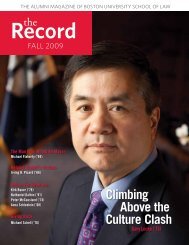the nature of representation: the cherokee right ... - Boston University
the nature of representation: the cherokee right ... - Boston University
the nature of representation: the cherokee right ... - Boston University
You also want an ePaper? Increase the reach of your titles
YUMPU automatically turns print PDFs into web optimized ePapers that Google loves.
2005] THE NATURE OF REPRESENTATION 123<br />
treaty promise to a delegate.<br />
The 1834 articles <strong>of</strong> agreement between John H. Eaton, U.S. Commissioner, and<br />
a delegation <strong>of</strong> Cherokees illustrates <strong>the</strong> difference at <strong>the</strong> time between <strong>the</strong><br />
Cherokees and U.S. on <strong>the</strong> issue <strong>of</strong> a delegate <strong>right</strong>. 163 Article III puts forth<br />
Cherokee desires:<br />
A desire is expressed that <strong>the</strong> Cherokee people may have a Delegate in <strong>the</strong><br />
House <strong>of</strong> Representatives: it is laudable, and evinces a desire for an onward<br />
march to improvement and civilization; but <strong>the</strong> treaty-making branch <strong>of</strong> <strong>the</strong><br />
Government is incompetent to grant such a privilege, it being one on which<br />
all <strong>the</strong> branches <strong>of</strong> <strong>the</strong> Government are necessary to a decision; but it is agreed<br />
that, as soon as a majority <strong>of</strong> <strong>the</strong> Cherokee people shall reach <strong>the</strong>ir western<br />
homes, <strong>the</strong> President will refer <strong>the</strong>ir application to <strong>the</strong> two Houses <strong>of</strong> Congress<br />
for <strong>the</strong>ir consideration and decision. 164<br />
The third article does two things: (1) it presents <strong>the</strong> difference between <strong>the</strong> U.S. and<br />
Cherokee positions prior to <strong>the</strong> New Echota Treaty, and (2) it highlights issues<br />
that arguably bear on <strong>the</strong> legitimacy <strong>of</strong> <strong>the</strong> later New Echota delegate promise.<br />
First, it is clear that Cherokees did express interest in a meaningful delegate<br />
promise; <strong>the</strong>refore, <strong>the</strong> eventual promise found in Article 7 <strong>of</strong> <strong>the</strong> New Echota<br />
Treaty was not simply a U.S. presented article but ra<strong>the</strong>r part <strong>of</strong> a negotiated<br />
understanding <strong>of</strong> terms associated with removal. 165 Second, <strong>the</strong> statement that <strong>the</strong><br />
163<br />
The 1834 articles <strong>of</strong> agreement reflect <strong>the</strong> negotiating stance <strong>of</strong> <strong>the</strong> U.S. from at<br />
least 1832 when a U.S. negotiator was sent on a mission to conclude a treaty that<br />
included <strong>the</strong> following provisions:<br />
4. To have an agent resident in Washington to represent <strong>the</strong>ir interest, who should<br />
be paid by <strong>the</strong> United States.<br />
5. With <strong>the</strong> consent <strong>of</strong> Congress <strong>the</strong>y should be organized as a Territory and be<br />
represented by a delegate in that body.<br />
ROYCE, supra note 2, at 135.<br />
164<br />
Articles <strong>of</strong> agreement entered into between John H. Eaton, Commissioner on <strong>the</strong><br />
part <strong>of</strong> <strong>the</strong> United States, and <strong>the</strong> Cherokee delegation <strong>of</strong> Indians, June 19, 1834, S. Exec.<br />
Doc. No. 23-7, 23d Cong., 1st Sess., at 4.<br />
165<br />
That <strong>the</strong> U.S. government understood <strong>the</strong> distinction between an agent and a<br />
delegate can be seen through Ronald Satz’s recording <strong>of</strong> a racist protest against an<br />
Indian delegate as part <strong>of</strong> removal:<br />
Democrat John Novell <strong>of</strong> Michigan vehemently opposed <strong>the</strong> attempt to provide <strong>the</strong><br />
Indians with a delegate in Congress in order to bind <strong>the</strong>m closer to <strong>the</strong> federal<br />
government. Novell, a Kentuckian by birth, feared that <strong>the</strong> proposal might be “<strong>the</strong><br />
entering wedge to something more.” He specifically warned that it might establish a<br />
precedent whereby abolitionists would later demand <strong>representation</strong> for free<br />
Negroes. Novell told his colleagues that he never wished to see <strong>the</strong> day when<br />
ei<strong>the</strong>r Indians or blacks held seats in Congress. On April 27 he <strong>of</strong>fered an<br />
amendment to <strong>the</strong> bill which sought to provide <strong>the</strong> tribesmen with an “agent” in<br />
Washington instead <strong>of</strong> a delegate to Congress.









